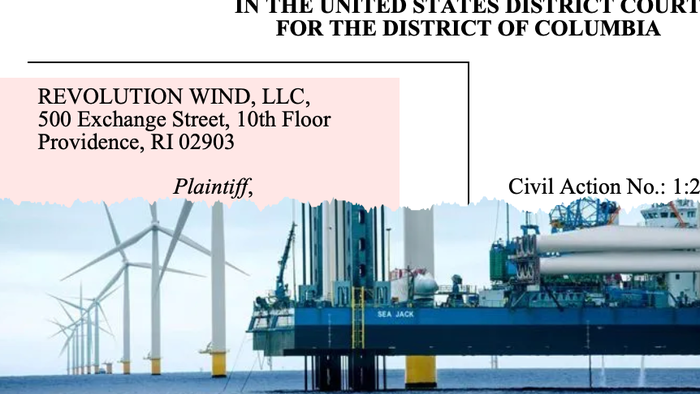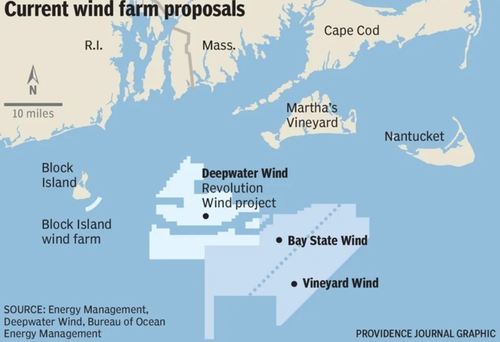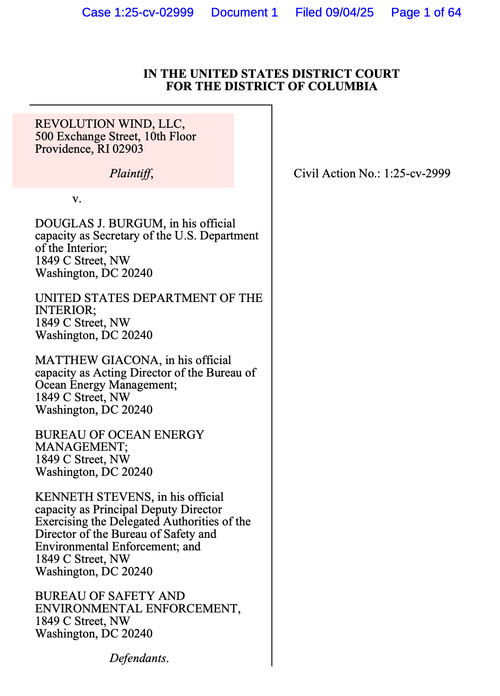


Revolution Wind LLC, co-owned by Orsted and Global Infrastructure Partners, sued the Trump administration on Thursday over last month's order halting construction of the 80%-complete Revolution Wind offshore project off Rhode Island. The multi-billion-dollar, 65-turbine wind farm was suspended by the Interior Department's Bureau of Ocean Energy Management (BOEM), which cited unspecified national security concerns.
The Orsted-backed wind farm venture sued the Trump administration in federal court in Washington. This came shortly before the attorneys general of Connecticut and Rhode Island announced lawsuits of their own in the U.S. District Court for Rhode Island to overturn the stop-work order on the wind farm project, which is slated to produce intermittent electricity (not reliable) for more than 350,000 homes.
"The Stop Work Order is invalid and must be set aside because it was issued without statutory authority, in violation of agency regulations and procedures and the Fifth Amendment's Due Process Clause, and is arbitrary and capricious," the lawsuit stated.
The lawsuit continued, "If unabated, the Stop Work Order will inflict devastating and irreparable harm on Revolution Wind. Revolution Wind has already spent or committed approximately $5 billion on the project, and will incur over $1 billion in breakaway costs if the project is cancelled, all of which Revolution Wind may lose if the unlawful Stop Work Order remains in effect."
Last month, the BOEM issued a directive (read here) to halt all offshore construction activities on the Revolution Wind project. The order stems from a Presidential Memorandum issued on Jan. 20, which triggered a broad review of renewable projects on the Outer Continental Shelf.
BOEM listed items it wanted to address with the project:
At a press conference earlier, Connecticut Attorney General William Tong called Trump's stop order an "all-out war" on wind power, adding, "This is an utterly unlawful and baseless — and frankly senseless and stupid stop-work order."
While White House spokeswoman Taylor Rogers told Bloomberg in a statement, "President Trump's day one executive order instructed agencies to review leases and permitting practices for wind projects with consideration for our country's growing demands for reliable energy, effects on energy costs for American families, the importance of marine life and fishing industry, and the impacts on ocean currents and wind patterns."
Here's UBS analyst Dominic Ellis' first take on the legal spat:
Orsted announced it is suing the Trump administration in an effort to get the stop work order on Revolution Wind removed. This does not look to me like a sign that behind the scenes negotiations are going well. From memory, Equinor threatened a lawsuit over Empire Wind but never formally filed before the suspension was lifted. Though over 68% of Orsted shareholders have indicated they will vote to approve the rights issue at tomorrow's EGM, the key question now is how soon (if at all) Orsted can resolve its issues in the U.S. The lawsuit suggests a resolution is not imminent, in my opinion, though obviously its impossible to tell from the outside looking in. Connecticut and Rhode Island have also both announced they are suing the administration.
Last month, Orsted shares in Denmark plunged due to the combination of a rights issue, a halt order on the wind farm, and overall pessimism across the green energy sector.
The Trump administration is prioritizing reliable, cheap fossil fuel power generation, along with a nuclear plant pipeline that is expected to be operational later this decade, extending into the 2030s. All of this stable power is what's needed on fragile grids nationwide amid the AI data center supercycle. Green is too fragile. We wouldn't be surprised if a few 'Solyndra-style' implosions rock the green industry within Trump's second term.


